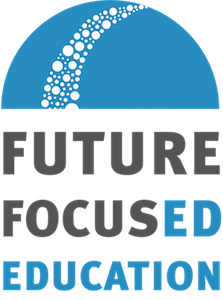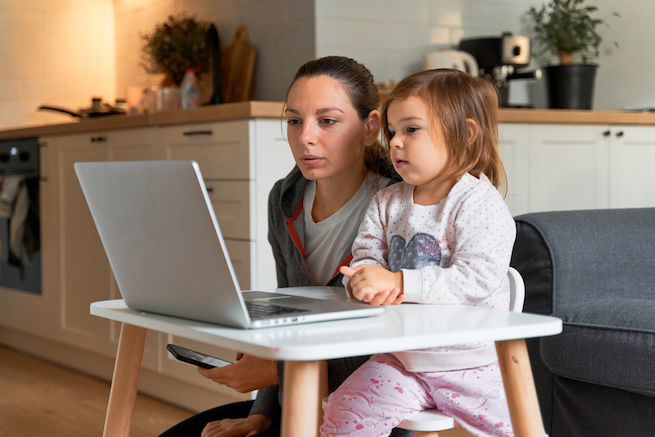Stop Leaving Young Parents Behind
How Paid Internships + SEL Practices Have Multigenerational Impact on Young Parents
“We are all doing the best we can as moms. I learned that as moms, we have a lot of skills already. I learned I’m not alone in these struggles.”
The challenges that young parents face are a tangled web of complexities related to transportation, childcare, housing and food insecurity, stigma, and discrimination—not to mention the need for academic, social, and emotional support.
Many services that work with young parents talk about supporting employment; however, many lack the capacity or employer relationships necessary to push and expand employment possibilities for young parents toward career pathways. This results in many young parents getting stuck in low paying, service industry jobs with little to no benefits or opportunity for advancement.
The Future Focused X3 Internship team decided to address this need by intentionally recruiting young parents into a new virtual internship X3 cohort. By using a cohort model, mentors and X3 staff are able to create supportive learning environments, with built in peer support, to foster work-based learning, with an intentional emphasis on work-based social and emotional skills—exactly what young parents are craving during this time of social isolation. Virtual internships allow for a lower pressure, scaffolded experience for young parents to build foundational work-based skills together with peers, while still benefiting from the mentorship and professional feedback from employer partners.
The First X3 Virtual Internship for Young Parents
We piloted the program last fall with a cohort of 12 young parents from Albuquerque, Rio Rancho, Cuba and Santa Fe. The internship trained the cohort to become peer supports and advocates for other young parents, especially during the pandemic.
The pilot was a huge success. Not only did the students successfully research and create a Parenting During the Pandemic Resource Guide built on their lived experience and expertise, they also grew their social capital. They interacted with a variety of professional providers in the fields of mental and behavioral health, child development, and the healthcare field during weekly guest speaker sessions.
It was inspiring to see our young parents rise to challenges of the virtual adaptation of the X3 experience, and while some of these successful outcomes were planned, some outcomes were a total surprise. Here are our main learning takeaways:
Our Top 4 SEL Takeaways:
-
Students Rose to the Challenge
“Wow miss! You really thought we could do this?”
An intern’s reaction to the expectation of the work-based deliverable to create the Parenting During the Pandemic Resource Guide; an illustration of challenging growth while assessing for needs and offering support along the way.
-
Students Recognized Their Worth and Abilities
“We are all doing the best we can as moms. I learned that as moms, we have a lot of skills already. I learned I’m not alone in these struggles.”
As mentors, we are called to identify and name skills and strengths by reframing the life experiences and cultural and linguistic assets of our young people, which may have been historically devalued, shamed or stigmatized.
-
Students Built Healthy Routines and Wellness Practices
“What I really liked the most was when we did the activities about our emotions and everything in the beginning where we had to write it down and share with everyone.”
Building in routines and rituals, by utilizing CASEL’s 3 Signature Practices, can support the growth of all 5 of CASEL’s SEL competencies by honing in on emotion identification, group energy, experientially practicing self regulation skills (that young people can lead), building peer relationships and problem solving capabilities.
-
Mentors Modeled Parenting On Screen (Inadvertently)
“Watching you both parent—showing up for us in this internship and for your kids—it took my excuses away. I thought if they can do it, I can do it and I owe it to the other moms on the call.”
One student’s reflection after seeing myself, a mother of an 8 and 1 year old, and the other co-facilitator, a mother of 2, actively having to parent while leading the internship sessions.
These reflections hit me personally. When my 1 year old son would Zoom bomb our sessions in toddler tears, what I thought was an embarrassing interruption, was actually a teaching and modeling moment. Hearing how impactful it was for the students to see us model and embrace our whole selves in the space—instead of trying to compartmentalize or distance our “professional” self away from our identity and responsibilities as mothers, women, mentors, caregivers, partners, etc.-- was truly powerful. It has inspired me to deepen my awareness, wellness practices and co-regulation skills so that I can respond in those stressful moments with patience and grace for my children, myself and others.
How to Create Safe Spaces for Young Parents
It was a challenge to create a space (a virtual one at that), which felt non-judgmental, supportive and safe for us all to show up and learn together. Not only that, we also needed to stay responsive to the needs of our children. What made the difference was including our children in our sessions, when possible and needed, instead of reinforcing societal pressure to apologize for having them around, in the name of what is deemed “professional”.
Just as mentors have been called to walk our talk to ensure we are practicing (in the most raw and real moments) our own SEL skills so that the young parent interns can see them being modeled in real time, the young parent interns are able to model these skills to their children; thus, creating a beautiful ripple effect of the work. Their children are witnesses to the practices and growth of their parents, socially, emotionally, and professionally.
What’s Next
By intentionally recruiting and engaging young parents into X3 paid internships, Future Focused is investing in a multigenerational impact. The momentum of this work has grown into another virtual internship this spring. This time, the New Mexico Public Education Department is the employer partner. The internship goal is to train young parents as event planners, consultants and speakers who will organize PED’s Virtual Town Hall for Young Parents and their Children; a virtual event for young parents statewide.
.
Stay tuned for more as this work evolves. Find out more about the X3 Internship program here.
Celebrate international SEL Day by sharing this article, or pledging your support for more SEL integration into our education systems. Find out more at: selday.org
.
Ali Moore is the Director of Student Support at Future Focused Education. She focuses on developing asset-driven, trauma-informed and inclusive school practices. With over 10 years of social work experience, she holds both a Masters in Social Work (MSW), with an International Concentration, from Dominican University, and a Bachelor’s Degree in Social Work from Pacific University.


